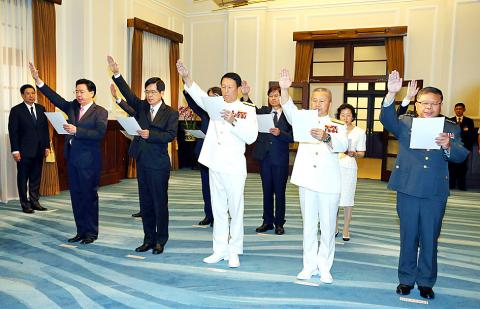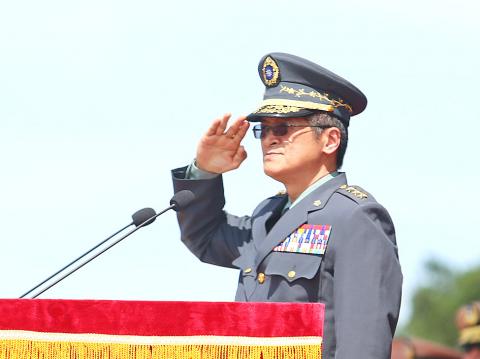The purpose and duties of President Tsai Ing-wen’s (蔡英文) National Security Council (NSC) are obscure, and despite a reshuffle of members, no clear strategic objectives have emerged, former national security officials said.
Tsai’s appointments seem to support no particular policy direction, compared with the national security teams of former presidents Chen Shui-bian (陳水扁) and Ma Ying-jeou (馬英九), which highlighted foreign policy and cross-strait relations respectively, former officials said.
Former chief of the General Staff Yen Teh-fa (嚴德發) and academic Tsai Ming-Yen (蔡明彥) were sworn in on Monday last week as NSC secretary-general and deputy secretary-general respectively.

Photo: CNA
The other two NSC deputy secretaries-general are polling expert Chen Chun-lin (陳俊麟) and national defense expert Chen Wen-jenq (陳文政). The five NSC advisers are lawyer and judicial reform leader Lin Feng-jeng (林?正), international finance lawyer Lin Liang-jung (林良蓉), Academia Sinica fellow and information security expert Lee Der-tsai (李德財) and former Mainland Affairs Council (MAC) deputy ministers Fu Dong-cheng (傅棟成) and Tung Chen-yuan (童振源).
Chen Shui-bian’s national security team was focused on expanding foreign relations, and former NSC secretaries-general Chiou I-jen (邱義仁), Mark Chen (陳唐山) and Kang Ning-hsiang (康寧祥) were in charge of developing ties with the US, according to a source who spoke on condition of anonymity.
During the same period, NSC deputy secretaries-general and other council members — including now-MAC Deputy Minister Lin Cheng-yi (林正義) and Taichung Mayor Lin Chia-lung (林佳龍) — were responsible for analyzing foreign relations, the source said.

Photo: CNA
Ma was pushing the Economic Cooperation Framework Agreement with China and aiming to develop cross-strait relations, so his NSC appointments — including former NSC secretary-general Su Chi (蘇起) and deputy secretary-general Kao Charng (高長) — were designed to forward that goal, the source said.
Experts in cross-strait trade were later added to Ma’s NSC team, including former minister of economic affairs John Deng (鄧振中) and former MAC minister Wang Yu-chi (王郁琦).
The NSC has four major roles: mid and long-term strategic planning, tactical operations for immediate purposes, daily administration and crisis management, former NSC deputy secretary-general Chang Jung-feng (張榮豐) said.
The NSC has to formulate plans for cross-strait and foreign relations to be employed over the next decade, but it also has to respond to rapidly changing events, such as the 1996 Taiwan Strait Crisis, which took place during former president Lee Teng-hui’s (李登輝) tenure, Chang said.
“The NSC is very important if it is valued by the president, but not important at all if it is not valued by the president,” Chang said.
The NSC advises the president on national security issues such as defense, foreign relations, cross-strait ties and major national emergencies, former NSC deputy secretary-general Michael Tsai (蔡明憲) said.
“It does not suit the NSC’s purpose to have judicial reform and polling experts in the NSC leadership,” Michael Tsai said.
The US last year passed the National Defense Authorization Act for Fiscal Year 2017 authorizing senior military exchanges with Taiwan, but Taipei has remained too conservative to seek increased military ties with the US, he said.
That Tung was appointed to the NSC last year after he resigned as Cabinet spokesman suggested that “Tsai Ing-wen does not place a high value on NSC functions,” the source said.
Tung is rumored to have been appointed representative to Thailand, the source said, adding that the president should use the opportunity to reorganize the NSC, as Tsai Ming-Yen is the only official tasked with foreign policy management, and that provides too little support for a Democratic Progressive Party government that is seeking to expand the nation’s international space.

Taiwan is stepping up plans to create self-sufficient supply chains for combat drones and increase foreign orders from the US to counter China’s numerical superiority, a defense official said on Saturday. Commenting on condition of anonymity, the official said the nation’s armed forces are in agreement with US Admiral Samuel Paparo’s assessment that Taiwan’s military must be prepared to turn the nation’s waters into a “hellscape” for the Chinese People’s Liberation Army (PLA). Paparo, the commander of the US Indo-Pacific Command, reiterated the concept during a Congressional hearing in Washington on Wednesday. He first coined the term in a security conference last

Prosecutors today declined to say who was questioned regarding alleged forgery on petitions to recall Democratic Progressive Party (DPP) legislators, after Chinese-language media earlier reported that members of the Chinese Nationalist Party (KMT) Youth League were brought in for questioning. The Ministry of Justice Investigation Bureau confirmed that two people had been questioned, but did not disclose any further information about the ongoing investigation. KMT Youth League members Lee Hsiao-liang (李孝亮) and Liu Szu-yin (劉思吟) — who are leading the effort to recall DPP caucus chief executive Rosalia Wu (吳思瑤) and Legislator Wu Pei-yi (吳沛憶) — both posted on Facebook saying: “I

The Ministry of Economic Affairs has fined Taobao NT$1.2 million (US$36,912) for advertisements that exceed its approved business scope, requiring the Chinese e-commerce platform to make corrections in the first half of this year or its license may be revoked. Lawmakers have called for stricter enforcement of Chinese e-commerce platforms and measures to prevent China from laundering its goods through Taiwan in response to US President Donald Trump’s heavy tariffs on China. The Legislative Yuan’s Finance Committee met today to discuss policies to prevent China from dumping goods in Taiwan, inviting government agencies to report. Democratic Progressive Party Legislator Kuo Kuo-wen (郭國文) said

Sung Chien-liang (宋建樑), who led efforts to recall Democratic Progressive Party (DPP) Legislator Lee Kun-cheng (李坤城), was released on bail of NT$80,000 today amid outcry over his decision to wear a Nazi armband to questioning the night before. Sung arrived at the New Taipei District Prosecutors’ Office for questioning in a recall petition forgery case last night wearing a red armband bearing a swastika, carrying a copy of Adolf Hitler’s Mein Kampf and giving a Nazi salute. Sung left the building at 1:15am without the armband and covering the book with his coat. Lee said today that this is a serious